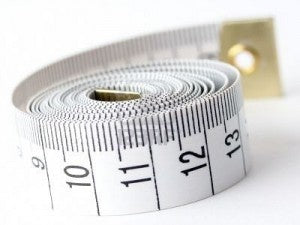Are you currently on a fat loss diet and workout program but aren’t seeing the results you had hoped for? Sadly, this is a very common situation that many people find themselves in and more often than not, it just leads to great frustration.
If you want to lose weight successfully, it’s vital that you learn how to do some troubleshooting so that you can assess what could be going wrong and then remedy the situation.
If you approach the situation with a clear and level mind and work out a solution, you can get back on track to success. Just avoid letting yourself get too emotional and frustrated as it is likely to decrease motivation levels.
Let’s look at five reasons you aren’t losing weight and what you can do about them.
#1 – You’re Not Tracking Calories
The very first and biggest reason you may not be losing weight is if you aren’t tracking calories. ![]() Your calorie intake is going to dictate whether or not you lose body fat, so getting it right is an absolute must, and the only way to ensure you are getting it right is to track it.
Your calorie intake is going to dictate whether or not you lose body fat, so getting it right is an absolute must, and the only way to ensure you are getting it right is to track it.
If you’re failing to track your calorie intake, results will elude you. Plus, if you aren’t seeing results, you’ll have absolutely no idea how to go about making adjustments because you have no idea how many calories you are taking in.
Start tracking – your success depends on it.
#2 – You Can’t Remember When You Weren’t Dieting
The next reason you may not be seeing the weight loss results you were after is because you’ve been dieting using an ultra-low calorie diet for as long as you can remember.
The thing to note here is that after every 6-8 weeks on a reduced calorie diet, it’s imperative that you take a bit of a diet break. This is going to help to reset all the hormones involved in fat burning and ensure that you are able to carry on again with a faster metabolism to burn body fat.
If you don’t take this break, it’s highly likely that your body will adapt to the reduced calorie intake you’re using and weight loss will slow.
As much as this brief diet break may feel like you’re moving backwards, you won’t be. It will only help you see faster success in the future and feel a lot better while you’re dieting as well.
Take three to seven days off your diet every 6-8 weeks. If you’re very lean and trying to lose the last 5-10 pounds, you may want to do this every 3-4 weeks instead, as your body will be adapting faster to that diet protocol.
#3 – You’re Not Measuring Accurately
 Another big reason why people often don’t see the success they’re after is because they aren’t measuring their food intake accurately. You’re making the effort to count calories, which is great, only your measurements are off so you’re actually taking in far more than you think you are.
Another big reason why people often don’t see the success they’re after is because they aren’t measuring their food intake accurately. You’re making the effort to count calories, which is great, only your measurements are off so you’re actually taking in far more than you think you are.
Take note that even slight misjudgements in food quantity can have enormous effects too. If you’re eating twice the amount of peanut butter you think you are on that morning slice of toast, you could be easily adding another 100-150 calories to your day.
Do this over a week and it’ll set you back over a quarter of a pound of weight loss you should have seen. And that’s just one misjudgement. Imagine if there’s five or six – you could easily wipe out your entire calorie deficit.
Get out the measuring spoons and cups along with a food scale and for at least one week, measure everything out. It’s the only way to know for certain you’re taking in what you need.
#4 – You’ve Done The Same Thing For Months
When was the last time you changed your workout or diet around? If you can’t remember, that’s a big problem. Not only does doing the same thing day after day lead to great amounts of boredom, but it’s a sure-fire way to hit a progress plateau as well.
You need to mix it up a bit – your results depend on it.
Try a new exercise in the gym. Stagger your calorie intake for a bit. Add some new healthy foods to your diet. Anything that you can do to shock your body slightly is going to help move you along and get faster results.
Little changes add up so don’t think you need a complete program overhaul but week to week adjustments are important.
#5 – You Haven’t Re-Assessed Your Calorie Intake After Losing Weight
Finally, the last reason you may not be losing weight is a very simple one and that is that you haven’t re-assessed your calorie intake after losing a good 10-20 pounds.
Remember, as you get lighter, your total daily maintenance calorie requirements will go down simply because you have less lean muscle mass to support.
So if you’ve lost 20 pounds and are still eating the same calorie intake you were 20 pounds heavier, you may actually be eating what it takes to maintain that new body weight, thus you aren’t seeing further fat loss.
As weight loss ensues, you’ll have to keep lowering your total fat loss calorie intake over time. Make it a point to re-assess your intake for every 10 pounds lost and this problem shouldn’t impact you.
So there you have the primary points to know about the key reasons why some people don’t see the weight loss results they desire. If you can make sure that you are taking steps to avoid these, you should be able to carry on to see optimal success without too much of an issue.
Just stay calm whenever a plateau hits and look at what might be going wrong. Often the answer to the problem is far more simple than you may think.
Let us know about your weigh loss goals. What has and hasn’t worked for you? Please comment below!

